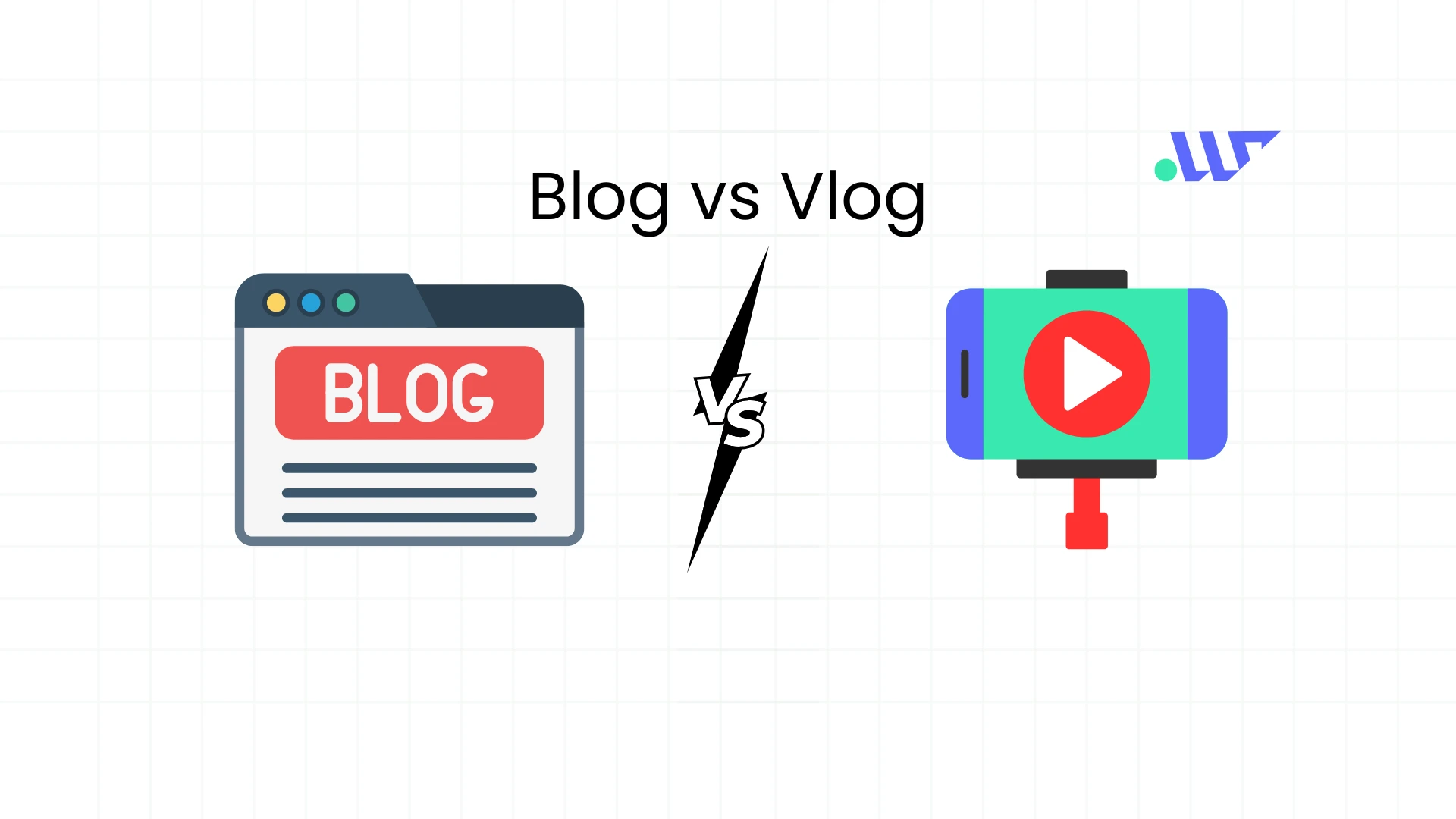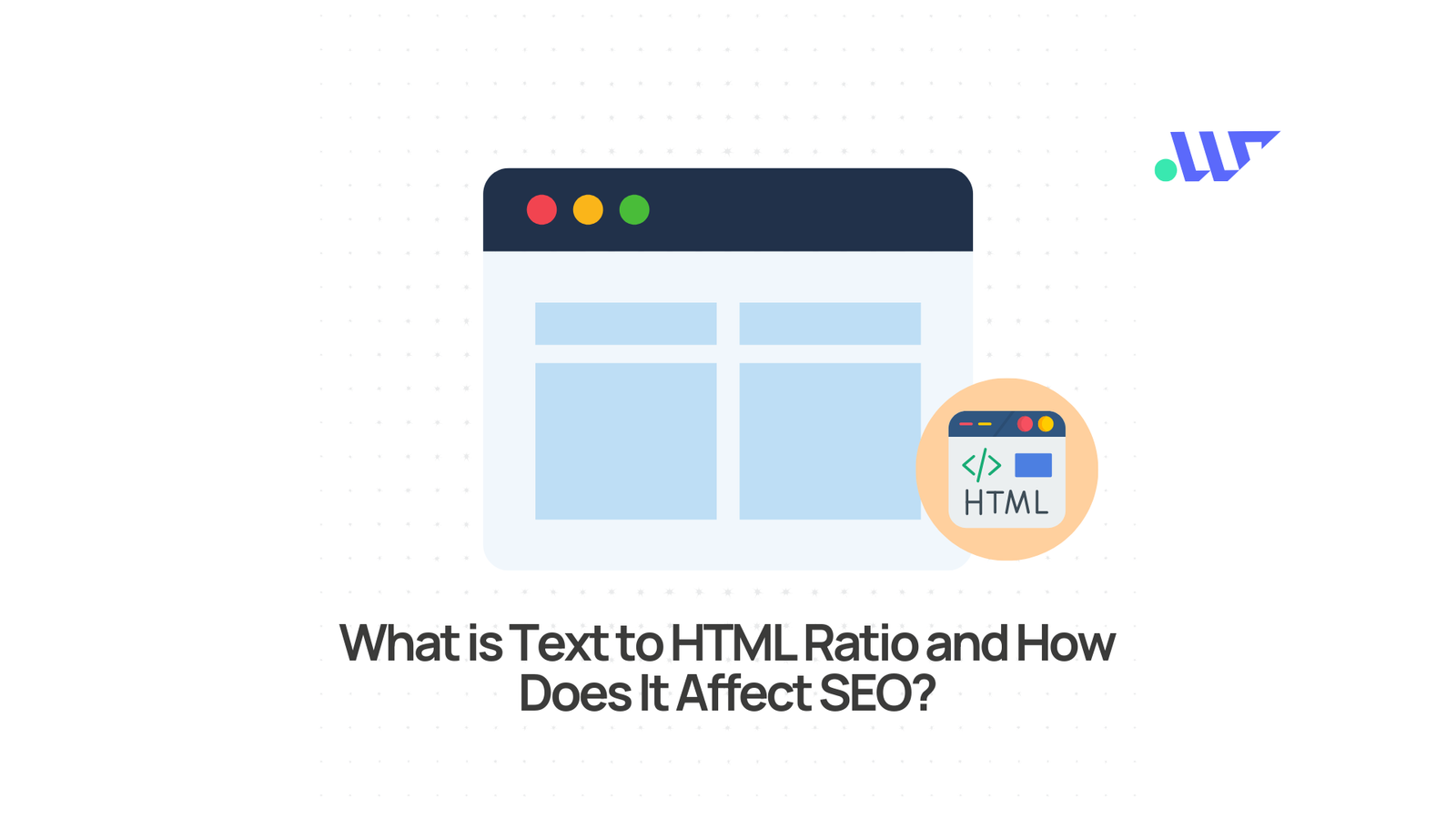Are you interested in creating content but unsure if blogging or vlogging is the best path for you? While both are popular ways to build an audience, they differ in important ways. Here’s the quick answer: A blog is text-based, focusing on written content, while a vlog uses video to connect with viewers more visually and personally. Each has its own strengths, and choosing between them depends on your goals, skills, and audience. Let’s dive into the details!
Table of Contents
What is a Blog?
A blog is a website or online journal that primarily uses text-based content to share ideas, insights, and information. Originally, blogs were simple online diaries, but today, they’re powerful tools for sharing knowledge, connecting with readers, and building a brand.
Here’s an example of a Blog that we have on our own website-
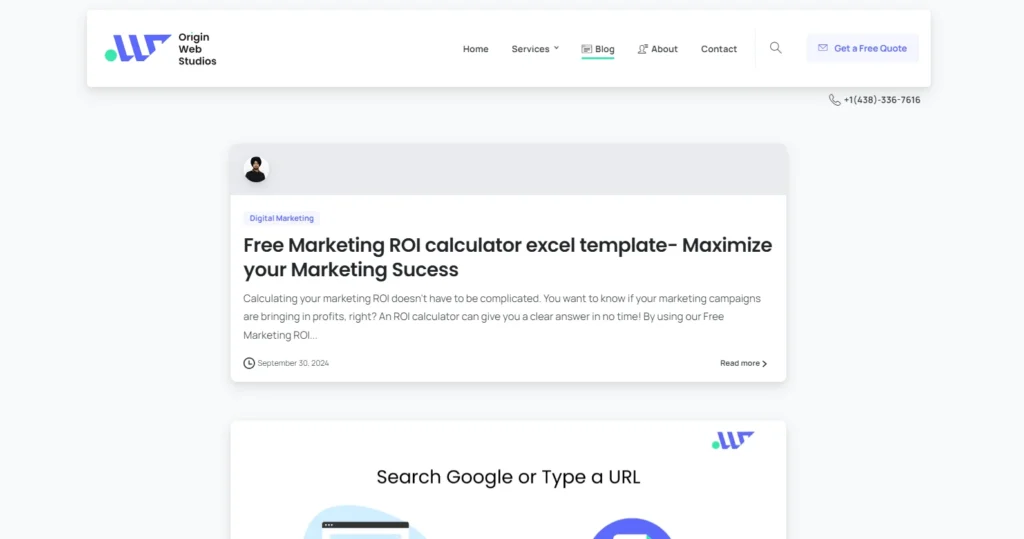
If you are looking to get your website designed contact Team Origin Web Studios Today!
Platform and Setup
Creating a blog is easier than ever. You can start a blog on a blogging platform like WordPress, Medium, or Blogger. These platforms often come with tools for writing, editing, and organizing your posts. Plus, blogs benefit greatly from SEO (Search Engine Optimization). With the right keywords and formatting, blogs can rank on search engines like Google, bringing in steady traffic.
Examples of Blog Content
Blogs can cover almost any topic. Here are some popular types of blog content:
- Tutorials: Step-by-step guides that help readers learn something new.
- Reviews: Opinions on products or services, useful for readers looking to make a purchase.
- Personal Stories: Sharing personal experiences to connect with readers on a deeper level.
Blogging allows you to share ideas and expertise in a way that readers can access anytime, anywhere.
What is a Vlog?
A vlog, short for video blog, is a form of content shared in video format. Vloggers use platforms like YouTube, TikTok, or Instagram to share their videos with a wide audience. While blogs rely on text, vlogs offer a more visual and personal experience for viewers, helping them connect with the vlogger directly.
Here’s an example of a Vlog on YouTube- Youtube Channel- Harman Bains
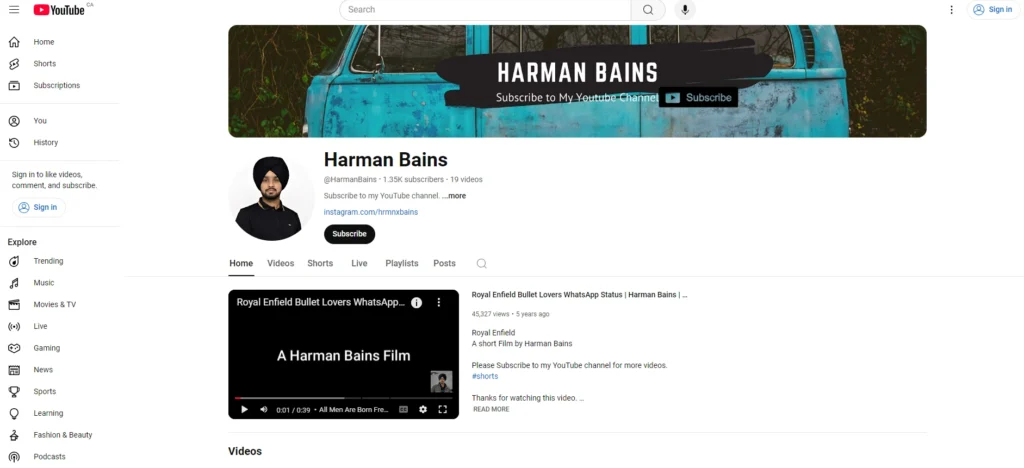
Platform and Setup
To start vlogging, you’ll need a platform for sharing video content (like YouTube) and some basic equipment: a smartphone or camera, a microphone, and possibly some video editing software. Vlogs are more engaging because viewers can see your expressions and personality on screen. This can be powerful in creating a personal connection with your audience.
Examples of Vlog Content
Popular types of vlogs include:
- Day-in-the-Life: Showing a typical day, often giving a behind-the-scenes look at the vlogger’s life.
- Tutorials: Similar to blogs but done on camera, like cooking recipes or DIY projects.
- Product Reviews: Opinions and demonstrations of products in video format, which can be very effective for showcasing products visually.
Key Differences Between Blogs and Vlogs
Content Format
The main difference between a blog and a vlog is in the content format. Blogs are text-based, while vlogs are video-based. Each type of content has unique advantages: blogs are ideal for detailed, written content on specific topics, and vlogs allow you to show more of your personality through video.
SEO and Search Engine Presence
Blogs often have an edge in SEO (Search Engine Optimization). Search engines like Google are set up to index text, so with proper SEO, blogs can attract organic traffic over time. Vlogs, on the other hand, require video SEO on platforms like YouTube, where optimized video titles, descriptions, and tags can help them rank well.
Audience Engagement
Blogs typically engage readers through comments and social shares. In contrast, vlogs help build more personal connections by allowing viewers to see and hear the vlogger. Vlogs often see higher engagement rates because viewers connect with the vlogger’s personality.
Barrier to Entry
Starting a blog is generally more affordable and accessible. All you need is a computer and internet access. Vlogging requires more equipment (camera, microphone) and skills (video editing), so the barrier to entry is slightly higher.
Key Differences Blogs vs Vlogs
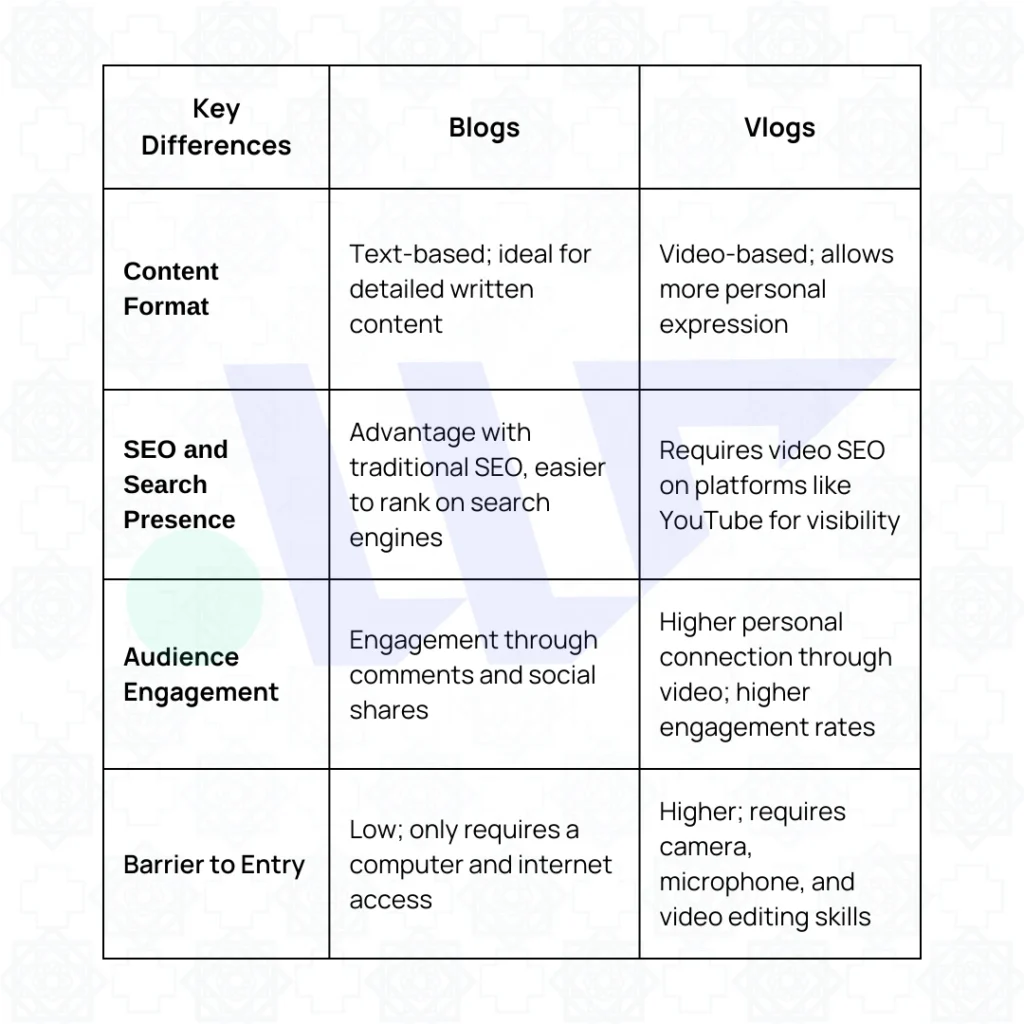
Pros and Cons of Blogging vs Vlogging
Pros of Blogging
- Low Cost: Blogging is budget-friendly, especially if you start with a free or low-cost platform.
- SEO Benefits: Blogs can rank on search engines, bringing steady traffic over time.
- Flexible Format: Blogs can be long or short, formal or casual, depending on your style.
Cons of Blogging
- Difficult to Build an Audience: With so many blogs, it takes time and effort to gain visibility.
- Tip: If you are thinking of starting a Blog, I would suggest choosing a topic that you like and you can brainstorm ideas for blog topics in your Mind. If you are able to think of many ideas it’s likely that niche will work for you because you have a good knowledge of it.
- Less Visual Appeal: Text may not be as engaging for all audiences, especially for younger viewers. You always have to write the content with a unique perspective, especially with the rise of AI-generated blogs on the Internet.
Pros of Vlogging
- Personal Connection: Vlogs allow viewers to see your personality, building stronger connections.
- “YouTube is the best platform to post these types of long-form videos, on an average people tend to engage with these videos and you are more likely to connect with the right audience”
- Engaging Visuals: Video content is highly engaging and often leads to higher viewership.
- Potential for Rapid Growth: With viral content, vlogs can grow audiences quickly.
“There are tons of creators who have grown their audience significantly on TikTok, YouTube, Instagram, and other social channels within months. Which is nearly unseen in blogging”
Cons of Vlogging
- Higher Cost and Skills Required: Vlogging requires equipment and editing skills.
- Time-Consuming Production: Filming and editing can take much longer than writing a blog post.
Monetization Potential: Blog vs Vlog
Making Money from Blogging
Blogging has many monetization options. Here are a few:
- Ads: Platforms like Google AdSense allow you to earn money through display ads on your blog.
- Affiliate Marketing: Earn a commission by promoting products on your blog.
- Selling Digital Products: You can sell ebooks, courses, or templates directly on your blog.
Making Money from Vlogging
Vlogging can also be profitable, especially on YouTube. Here’s how:
- Video Ads: Join the YouTube Partner Program to make money from ads on your videos.
- Sponsorships: Brands pay vloggers to feature their products in videos.
- Fan Donations: Platforms like Buy Me a Coffee allow fans to support your content directly.
Tips for Choosing Between a Blog or a Vlog
Think About Your Strengths: If you enjoy writing and are comfortable researching topics, blogging might be the better fit. If you’re comfortable on camera and prefer a conversational tone, consider vlogging.
Choose the Right Platform: Blogs do best on platforms optimized for text, like WordPress or Medium. Vlogs thrive on platforms like YouTube, where viewers come for video content.
Consider Your Audience: Some audiences prefer reading in-depth articles, while others are more engaged by videos. Knowing your audience can help you choose the right format.
Experiment with Both: Many successful creators combine blogging and vlogging to reach a wider audience. For example, you can write a blog post and add a short video version, or embed a vlog into a blog post.
Conclusion: Which Content Format is Right for You?
Deciding between a blog or a vlog comes down to your strengths, interests, and goals. Blogging is great for detailed, written content and can bring steady traffic through SEO. Vlogging, however, builds a personal connection through video and can quickly grow an audience with engaging visuals. Whether you prefer to start a blog or a vlog, both can be rewarding paths if you stay consistent, engage with your audience, and keep creating content.
Ultimately, you can try both to see what suits you best. Ready to start sharing your ideas? Whether it’s a blog or a vlog, your audience is out there waiting!
